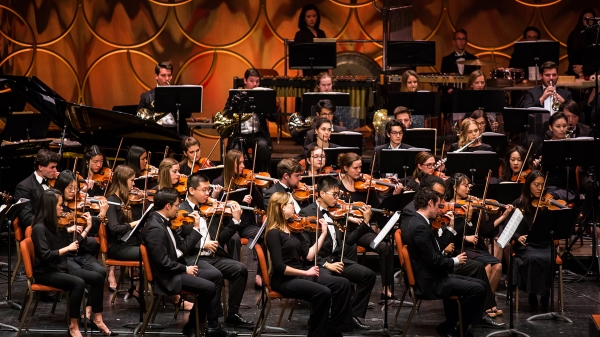Musicology professor wins prestigious Berlin Prize fellowship

Peter Schmelz, associate professor in the School of Music
Peter Schmelz, an associate professor in ASU's School of Music, has been named a recipient of the prestigious Berlin Prize, a semester-long fellowship in Berlin awarded annually to top-tier scholars, writers and artists from the United States. Schmelz is the third faculty member from Arizona State University to be honored with this fellowship.
Schmelz is among 22 recipients announced May 10 by the American Academy in Berlin who represent “the highest standards of excellence in their fields,” the academy said.
“We are thrilled that the American Academy in Berlin has recognized the outstanding contributions that Peter Schmelz is making to the field of musicology and the humanities with the coveted Berlin Prize,” said Heather Landes, director of the School of Music in the Herberger Institute for Design and the Arts. “This award is a testament to the significance and impact of Schmelz’s scholarly work, and we look forward to the results of his stay in Berlin.”
Schmelz’s areas of expertise include 20th and 21st-century music; Russian, Ukrainian and Soviet music, and music in the Cold War. He is currently completing a book on polystylism as cultural practice in the late USSR, focusing on the music of Alfred Schnittke and Valentin Silvestrov, and he recently won an ASCAP Foundation Deems Taylor/Virgil Thomson Award, which honors outstanding print, broadcast and new media coverage of music, for an article on Silvestrov’s Symphony No. 5.
“I am very excited and grateful to have the opportunity to live in Berlin at the American Academy,” Schmelz said of the Berlin Prize. “Because of the strong currents of opposition today to both the European Union and to an outward-facing, globally-engaged United States, institutions like the American Academy that foster transnational dialogue are more important than ever.”
During his time in Berlin, Schmelz will be researching a book that considers unofficial networks of musical exchange during the Cold War between Russia, Ukraine and West Germany. His previous research has focused on the music of the Soviet Union, including the significant roles it played both at home and abroad during the Cold War.
“Over the past few years my work has moved toward Germany and Ukraine, partly spurred by contemporary events, notably those events associated with the Maidan protests of 2013-14 in Kyiv,” Schmelz said. “My new topic also engages with other issues very much in the news today, among them the functions of non-state actors in international affairs, and the crucial importance of information in both official and unofficial diplomacy.”
Since the inception of the Berlin Prize in 1998, the Berlin Academy has become one of Europe’s most visible and effective institutions of cross-cultural dialogue and has established a widespread and long-lasting network for the critical exchange of ideas necessary in today’s world.
More Arts, humanities and education

ASU Symphony Orchestra welcomes visionary conductor Jonathan Taylor Rush
Guest conductor Jonathan Taylor Rush will join Arizona State University’s Jason Caslor, director of bands, to lead the ASU…

Chemistry classes are key to art student's success
Amanda Barnette has a passion for art preservation. That means that, for the past four years, the Arizona State University…

ASU+GSV Summit tackles big questions about AI, technology, education
Editor's note: We'll be updating this story daily throughout the summit. The annual ASU+GSV Summit kicked off in San Diego on…